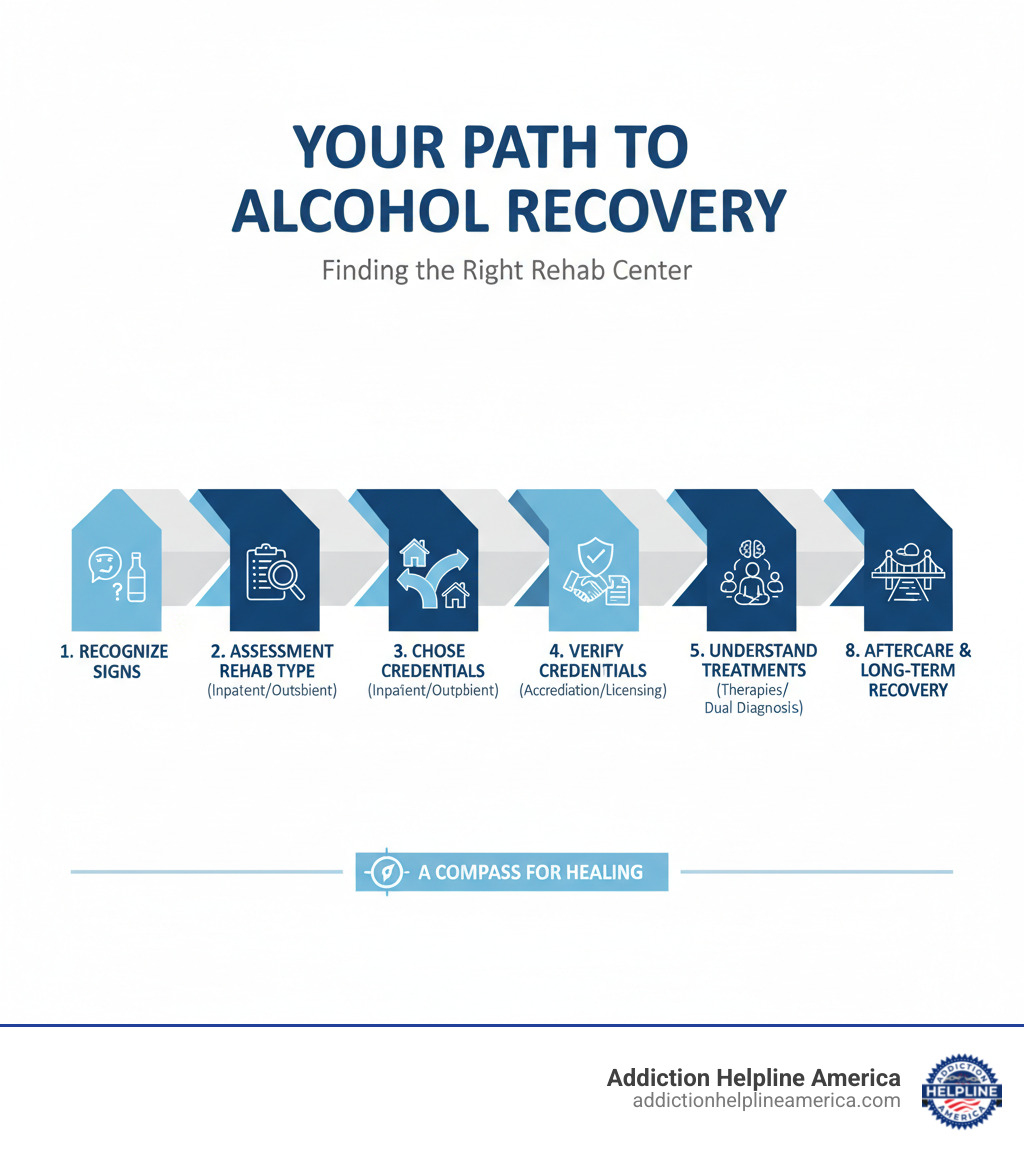
Why Finding the Right Alcohol Rehab Center Is Your First Step to Recovery
How to find a good alcohol rehab center starts with understanding what quality care looks like and knowing the right questions to ask. Here’s a quick roadmap:
- Identify your specific needs – Consider the severity of your addiction, any mental health concerns, and whether you need inpatient or outpatient care
- Verify credentials – Look for facilities accredited by CARF or licensed by state authorities, with qualified staff holding proper certifications
- Evaluate treatment approaches – Ensure they offer evidence-based therapies like CBT, DBT, and Motivational Interviewing
- Check for dual diagnosis capability – Approximately 50% of people with substance use disorders have co-occurring mental health needs
- Understand costs and options – Verify insurance coverage, compare public vs. private options, and explore financing
- Assess aftercare support – Quality centers provide continuing care and relapse prevention resources
The search for alcohol treatment can feel overwhelming, but it’s a crucial first step. Substance Use Disorder (SUD) is a treatable medical condition that affects millions. Recognizing the signs—like withdrawal, hiding drinking habits, or experiencing negative health effects—is the first hurdle. The damaging effects of alcohol on the brain, heart, and liver underscore the need for professional help.
Choosing to find help is one of the most important steps you can take. This guide is your compass for finding the right rehab, one that meets your unique needs for medical detoxification, residential care, or outpatient programs. We’ll walk you through recognizing when help is needed, understanding program types, vetting facilities, and planning for long-term success.
At Addiction Helpline America, our specialists have connected thousands of people with the resources they need to begin their journey toward lasting recovery. We’re here to help you steer how to find a good alcohol rehab center.
Simple guide to how to find a good alcohol rehab center:
- how to find rehab programs that accept insurance
- where can i find alcohol rehab in florida
- luxury rehab finder
Recognizing the Need and Understanding Your Options
Recognizing the need for help is often the hardest part of recovery. Understanding the signs of alcohol addiction and the available treatment options can empower you to take that crucial first step.
The Signs and Symptoms of Alcohol Addiction
Alcohol Use Disorder can manifest in different ways. Physical symptoms include intense cravings and withdrawal symptoms like shaking, sweating, nausea, or anxiety when you try to stop. Behavioral changes may involve hiding drinking, an inability to limit consumption, and experiencing legal or financial problems due to alcohol. Psychological signs often include a feeling of powerlessness over drinking or a compulsive need to drink to cope with daily life.
Over time, alcohol takes a serious toll on the body. It disrupts the brain’s communication pathways, increases the risk of heart problems like high blood pressure and stroke, causes liver disease like cirrhosis, and weakens the immune system. When these signs interfere with your health and happiness, it’s time to seek professional help.
The Main Types of Alcohol Rehab Programs
Understanding how to find a good alcohol rehab center starts with knowing the types of programs available.
Medical Detoxification is often the first step, providing medically supervised withdrawal to manage symptoms safely. It typically lasts three to seven days and stabilizes you for further treatment, but it is not a complete treatment on its own.
Inpatient or Residential Rehab offers the most comprehensive care. You live at the facility, receiving 24/7 support in a structured environment away from daily triggers. This is ideal for severe addiction, with programs typically lasting 28 to 90 days or more. Longer stays are consistently linked to better outcomes.
Outpatient Programs offer flexibility for those who can’t leave work or family duties. They vary in intensity, from Partial Hospitalization Programs (PHP) with daily sessions to Intensive Outpatient Programs (IOP) a few days a week, and Standard Outpatient Programs (OP) with weekly sessions. These programs allow you to live at home while receiving professional support.
Sober Living Homes act as a bridge between intensive treatment and independent living. They are structured, substance-free homes where residents support each other while transitioning back to daily life.
Choosing the right program depends on the severity of your addiction, your health needs, and your personal situation. Understanding your options is key to finding a center that truly meets your needs.
How to Find a Good Alcohol Rehab Center: A Step-by-Step Guide
Finding the right alcohol rehab center is a manageable process when broken down into clear steps. This guide will help you steer the decision with confidence.
Step 1: Identify Your Specific Needs and Recovery Goals
Before you start your search, conduct an honest self-assessment. What are your recovery goals? Consider your substance use history and any co-occurring mental health needs like depression or anxiety. Approximately 50% of people with substance use disorders have a co-occurring condition, making it essential to find a center that specializes in dual diagnosis treatment. Also, think about personal preferences, such as location and environment. A clear assessment will guide you toward the most suitable program, as one size does not fit all in recovery.
Step 2: How to find a good alcohol rehab center by Vetting Potential Facilities
Now it’s time to research potential facilities to ensure they provide quality care.
Accreditation and licensing are non-negotiable. Verify that the facility is licensed by its state and look for accreditation from national bodies like the Commission on Accreditation of Rehabilitation Facilities (CARF). CARF accreditation signifies that a center meets high standards for quality and safety.
Verifying staff qualifications is also critical. The team should include licensed therapists, medical doctors, nurses, and addiction specialists with recognized credentials and experience.
The location and environment should feel safe and conducive to healing. Consider whether you’d benefit from a serene setting away from daily triggers or if staying closer to family support is more important.
When researching success rates, ask for patient outcome data. Reputable centers are transparent about their results. Alumni testimonials can also provide valuable insight into a center’s effectiveness and whether it delivers on its promises.
Step 3: Understanding Treatment Approaches and Therapies
The heart of any rehab program is its therapeutic approach. The best centers offer a range of therapies to address the mind, body, and spirit.
Evidence-based therapies are treatments scientifically proven to be effective. Look for cornerstone approaches like Cognitive Behavioral Therapy (CBT), which changes negative thought patterns; Dialectical Behavior Therapy (DBT), which focuses on emotional regulation; and Motivational Interviewing (MI), which helps resolve ambivalence about change. For more details, you can visit the National Institute on Alcohol Abuse and Alcoholism.
Quality programs also offer holistic approaches that heal the whole person. This can include nutritional guidance, physical exercise, mindfulness, meditation, and yoga to help reconnect the mind and body.
Finally, ensure the center provides dual diagnosis treatment if you have a co-occurring mental health disorder. Integrated programs that treat both addiction and mental health conditions simultaneously are crucial for long-term success. Look for centers that offer trauma-informed care, which prioritizes creating a safe and supportive environment for healing.
At Addiction Helpline America, we help you find a center that addresses all these dimensions of care, matching you with a facility that fits your specific needs.
The Logistics of Rehab: Duration, Cost, and Admission
Once you’ve shortlisted potential facilities, it’s time to address the practical questions of program length, cost, and the admission process.
How Program Length Affects Recovery Outcomes
When it comes to addiction treatment, research consistently shows that longer programs produce better results. Long-term programs (90 days or more) allow for deeper work on underlying issues and give you time to practice relapse prevention skills until they become second nature. Short-term programs (28-42 days) can be effective for initial stabilization but may not provide enough time to build a solid foundation for lifelong recovery. While flexible-length programs offer convenience, it’s important to weigh this against the proven benefits of more immersive treatment.
How to find a good alcohol rehab center by Comparing Public vs. Private Options
There are two main types of facilities: public and private. Public rehab centers are state-funded, making them free or low-cost. However, they often have long waitlists, higher staff-to-patient ratios, and more standardized programs. Private rehab centers typically cost more but offer immediate admission, better amenities, and highly personalized care with more individual attention. The right choice depends on your financial situation, the urgency of your need, and the environment where you will heal best.
Navigating the Cost of Rehab and Financial Options
The cost of rehab can feel daunting, but the cost of not getting help is almost always greater. When assessing a program, ask for a detailed breakdown of all fees to avoid surprises. The good news is that many insurance plans cover addiction treatment. We can help you verify your coverage and understand your out-of-pocket costs. If you’re uninsured, don’t let that stop you. Many centers offer financing options like payment plans, sliding-scale fees based on income, or scholarships. The goal is to find a balance between what you can afford and the quality of care you need.
What to Expect During the Intake and Admission Process
The admission process is designed to be supportive and straightforward.
- Initial Call: Your first contact is a no-pressure conversation to ask questions and get information.
- Pre-admission Assessment: A professional will evaluate your health and history to help create a personalized treatment plan.
- What to Bring: The facility will provide a list of approved items, such as comfortable clothing and personal hygiene products, and a list of prohibited items.
- Arrival and Orientation: Upon arrival, staff will welcome you, explain the daily schedule and rules, and help you get settled.
- Individualized Treatment Plan: You’ll work with your team to create a personalized plan with clear goals for your recovery. This plan will evolve as you progress.
Beyond Treatment: Ensuring Long-Term Success
Completing a rehab program is a major accomplishment, but it’s the beginning of a lifelong recovery journey that requires ongoing commitment and support.
The Critical Role of Aftercare and Relapse Prevention
Continuing care, or aftercare, is essential for navigating the challenges of life after treatment. The best rehabs build relapse prevention into their programs from day one, teaching you practical skills to manage triggers and cravings. After you leave, support groups like 12-Step programs (Alcoholics Anonymous) or alternatives like SMART Recovery provide an invaluable network of peers who understand your journey. You can find local support groups to fit your needs. Many centers also offer alumni programs for ongoing connection and accountability. When evaluating how to find a good alcohol rehab center, always ask about their aftercare services.
How to Support a Loved One in Their Recovery Journey
If you’re supporting a loved one, the decision to seek treatment must be theirs. You can’t want sobriety for them more than they want it for themselves. The most powerful thing you can do is offer non-judgmental support, express your concern, and let them know you’re there for them.
Once they enter treatment, your involvement is critical. Participate in family programs to learn about addiction, improve communication, and begin rebuilding trust. It’s also vital to set healthy boundaries to protect your own well-being while supporting their recovery. Addiction is a family disease, and at Addiction Helpline America, we connect families with resources that support everyone’s healing.
Recovery transforms lives—not just for the person with the addiction, but for everyone who loves them. With the right support during and after treatment, lasting recovery is not just possible, but probable.
Frequently Asked Questions about Finding Alcohol Rehab
It’s normal to have questions about how to find a good alcohol rehab center. Here are clear, honest answers to some common concerns.
What is a dual diagnosis and why is it important in treatment?
A dual diagnosis is when a person has both a substance use disorder and a co-occurring mental health condition like depression, anxiety, or PTSD. This is important because approximately 50% of people with addiction have a dual diagnosis. The two conditions often fuel each other, so treating only the addiction while ignoring the underlying mental health issue is rarely effective. Integrated treatment, which addresses both conditions simultaneously, is essential for lasting recovery.
How do I verify the accreditation of a rehab center?
Verifying credentials protects you from low-quality programs. Follow these simple steps:
- Check for national accreditation from bodies like CARF (Commission on Accreditation of Rehabilitation Facilities) on the center’s website.
- Confirm state licensing by checking with your state’s Department of Health or a similar regulatory agency.
- Ask admissions staff directly for proof of current licensing and accreditation. A reputable center will provide this information readily.
What is the difference between detox and rehab?
Understanding this distinction is crucial. Detox manages the physical symptoms of withdrawal safely under medical supervision. It is the necessary first step, typically lasting 3 to 7 days, that stabilizes the body. However, detox is not a full treatment.
Rehab addresses the psychological and behavioral aspects of addiction. This is where the real work of recovery happens through individual and group therapy, skill-building, and relapse prevention planning. For lasting success, detox must be followed by a comprehensive rehabilitation program.
Your Journey to a Healthier Future Starts Now
You’ve taken a courageous step by learning how to find a good alcohol rehab center. You now have the knowledge to recognize quality care, ask the right questions, and make an informed choice for yourself or a loved one. Recovery is a lifelong journey, but it starts with this single step. Reaching out can feel vulnerable, but support is available right now. You don’t have to do this alone.
At Addiction Helpline America, we provide free, confidential guidance to connect you with the right program from our network of treatment centers. We serve individuals and families across the nation, including in Alabama, Alaska, Arizona, Arkansas, California, Colorado, Connecticut, Delaware, Florida, Georgia, Hawaii, Idaho, Illinois, Indiana, Iowa, Kansas, Kentucky, Louisiana, Maine, Maryland, Massachusetts, Michigan, Minnesota, Mississippi, Missouri, Montana, Nebraska, Nevada, New Hampshire, New Jersey, New Mexico, New York, North Carolina, North Dakota, Ohio, Oklahoma, Oregon, Pennsylvania, Rhode Island, South Carolina, South Dakota, Tennessee, Texas, Utah, Vermont, Virginia, Washington, West Virginia, Wisconsin, Wyoming, and the District of Columbia.
Our team will listen to your story, help with insurance verification, and match you with a facility that fits your unique needs. Your journey to a healthier future starts now.
Find a rehab center today. Your healthier future is waiting.
Our helpline is 100%
free & confidential
If you or someone you care about is struggling with drug or alcohol addiction, we can help you explore your recovery options. Don’t face this challenge alone—seek support from us.
Programs
Resources
Will my insurance
cover addiction
treatment?
We're ready to help
Find the best
drug or alcohol treatment
center
Are you or a loved one struggling with addiction? Call today to speak to a treatment expert.
















